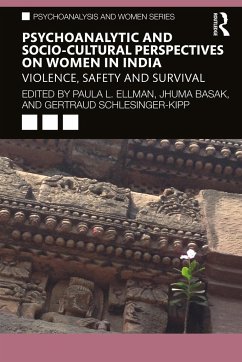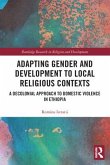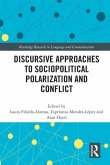This important book provides a bridge between psychoanalytic perspectives and socio-cultural issues to shine a spotlight on the experiences of women in India today.
Women's well-being and security has often depended upon their gender positioning while other binaries like rural-urban, class, and caste have also played a crucial role globally and especially in India. Historically, women have been subjected to various forms of oppression that include sex selective abortions, domestic violence, bride burning for dowry, and acid attacks. Threats to women's security have recently increased with progressive polarization and hardening of socio-political and cultural ideologies. This book assesses how women's lives are impacted by these social and cultural conventions and stigma, including ideas around motherhood, religion, intimacy and femininity itself, and the psychological implications these have. Topics include the seduction of religion, motherhood in contemporary times, intimacy and violence, and fundamentalist states of mind in the clinical space. While the book echoes a regional specificity, it simultaneously resonates a backdrop of global change of affairs that has its impact on ideological freedom and the concept of inclusivity in terms of gender, race, culture, and politics across the world. For this comprehensive perspective, the effort is to create a platform of authors comprising psychoanalysts, social scientists, scholars from the liberal arts discipline, as well as social activists.
In a country where women have been historically subjected to both psychological and physical oppression, this timely and original book will interest a range of scholars interested in gender, mental health and contemporary Indian society, as well as clinicians in the field.
Women's well-being and security has often depended upon their gender positioning while other binaries like rural-urban, class, and caste have also played a crucial role globally and especially in India. Historically, women have been subjected to various forms of oppression that include sex selective abortions, domestic violence, bride burning for dowry, and acid attacks. Threats to women's security have recently increased with progressive polarization and hardening of socio-political and cultural ideologies. This book assesses how women's lives are impacted by these social and cultural conventions and stigma, including ideas around motherhood, religion, intimacy and femininity itself, and the psychological implications these have. Topics include the seduction of religion, motherhood in contemporary times, intimacy and violence, and fundamentalist states of mind in the clinical space. While the book echoes a regional specificity, it simultaneously resonates a backdrop of global change of affairs that has its impact on ideological freedom and the concept of inclusivity in terms of gender, race, culture, and politics across the world. For this comprehensive perspective, the effort is to create a platform of authors comprising psychoanalysts, social scientists, scholars from the liberal arts discipline, as well as social activists.
In a country where women have been historically subjected to both psychological and physical oppression, this timely and original book will interest a range of scholars interested in gender, mental health and contemporary Indian society, as well as clinicians in the field.
"Psychoanalytic and Socio-Cultural Perspectives on Women in India: Violence, Safety and Survival offers both a distinctly psychoanalytic view of the trauma and resilience of women in India and an interdisciplinary consideration of their religious, familial, societal situation historically and currently. Horrifying abuse of Indian women is juxtaposed with clinical and social documentation of women's fierce public insistence on equality and justice. This presentation of the impacts of fundamentalism, patriarchy, and severe socio-cultural endangerment constitutes an inspiring and scholarly contribution to clinicians' and social scientists' work with underprivileged women world-wide." - Harriet Wolfe, M.D. is President-elect of the International Psychoanalytical Association and Clinical Professor of Psychiatry and Behavioral Sciences at the University of California San Francisco.
"Psychoanalytic and Socio-cultural Perspectives on Women in India , another remarkable book produced by COWAP, one of the most relevant IPA committees, shows how Psychoanalysis is able to shed light on a complex reality , both psychological and social, hand in hand with other disciplines. The life of women in India, so well depicted in this excellent book, both in their inner lives and in the culture they live in, is a remarkable contribution to our growing awareness of the feminine , its glories and difficulties, and once again illustrates the development of psychoanalytic understanding of human mind and body in different cultures. I strongly recommend this book and congratulate its authors." - Cláudio Laks Eizirik, IPA Past President, Professor Emeritus of Psychiatry, Federal University of Rio Grande do Sul, Brazil, Sigourney Award, 2011.
"Psychoanalytic and Socio-cultural Perspectives on Women in India , another remarkable book produced by COWAP, one of the most relevant IPA committees, shows how Psychoanalysis is able to shed light on a complex reality , both psychological and social, hand in hand with other disciplines. The life of women in India, so well depicted in this excellent book, both in their inner lives and in the culture they live in, is a remarkable contribution to our growing awareness of the feminine , its glories and difficulties, and once again illustrates the development of psychoanalytic understanding of human mind and body in different cultures. I strongly recommend this book and congratulate its authors." - Cláudio Laks Eizirik, IPA Past President, Professor Emeritus of Psychiatry, Federal University of Rio Grande do Sul, Brazil, Sigourney Award, 2011.








